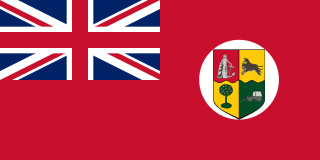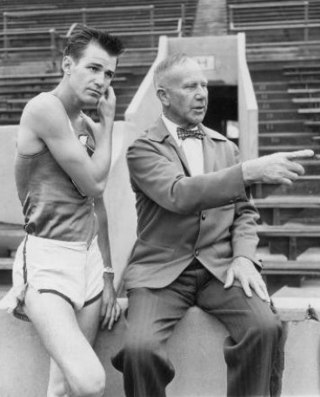The men's 400 metres was the third-shortest of the men's track races in the Athletics at the 1964 Summer Olympics program in Tokyo. It was held on 17 October, 18 October, and 19 October 1964. 55 athletes from 36 nations entered, with 5 not starting in the first round. The first two rounds were held on 17 October, with the semifinals on 18 October and the final on 19 October. The maximum number of athletes per nation had been set at 3 since the 1930 Olympic Congress. The event was won by 0.1 seconds by Mike Larrabee of the United States, the third consecutive and tenth overall victory for an American in the event. Trinidad and Tobago and Poland each earned their first medal in the 400 metres.

The men's 400 metres hurdles was the longer of the men's hurdle races in the Athletics at the 1964 Summer Olympics program in Tokyo. It was held on 14 October, 15 October, and 16 October 1964. 39 athletes from 26 nations competed, with 1 more not starting in the first round. The maximum number of athletes per nation had been set at 3 since the 1930 Olympic Congress. The first round was held on 14 October, with the semifinals on 15 October and the final on 16 October. The event was won by Rex Cawley of the United States, the nation's sixth consecutive and 11th overall victory in the men's 400 metres hurdles. For the first time since 1952, the Americans did not sweep the event. John Cooper earned Great Britain's first medal in the event since 1928 with his silver; Salvatore Morale took Italy's first-ever medal in the 400 metres hurdles with his bronze.

The men's 200 metres was a track and field athletics event held as part of the Athletics at the 1912 Summer Olympics programme. It was the fourth appearance of the event, which has appeared at every edition of the Summer Olympics since the 1900 Summer Olympics. The competition was held on July 10, 1912, and on July 11, 1912. 61 runners from 19 nations competed. NOCs could enter up to 12 athletes. The event was won by Ralph Craig of the United States, the nation's third victory in four Games. Another American, Donald Lippincott, took silver. Great Britain earned its first medal in the 200 metres with Willie Applegarth's bronze.

The Union of South Africa competed at the 1920 Summer Olympics in Antwerp, Belgium. 39 competitors, 38 men and 1 woman, took part in 34 events in 7 sports.
The men's 400 metres event at the 1996 Summer Olympics in Atlanta, Georgia took place between 26 and 29 July. There were 62 competitors from 42 countries. The maximum number of athletes per nation had been set at 3 since the 1930 Olympic Congress.
The men's 400 metres was an event at the 1928 Summer Olympics in Amsterdam. Fifty athletes from 20 nations competed. NOCs were limited to 4 competitors each. The event was won by Ray Barbuti of the United States, the first title for the Americans in the event since 1912 and the fifth overall. Jimmy Ball won Canada's first medal in the event, a silver.
The men's 100 metres event was part of the athletics programme at the 1920 Summer Olympics. The competition was held on August 15 and 16, 1920. The event was won by Charley Paddock of the United States. Great Britain won its first medal in the event, a bronze by Harry Edward.

The men's 200 metres event was part of the track and field athletics programme at the 1920 Summer Olympics. The competition was held on Thursday, August 19, 1920, and on Friday, August 20, 1920. Forty-eight sprinters from 22 nations competed. Nations were limited to 4 athletes each, down from the 12 allowed in previous Games. The event was won by Allen Woodring of the United States, the nation's second consecutive victory in the event and fourth in five Games. Fellow American Charley Paddock took silver. Great Britain reached the podium for a second consecutive Games with Harry Edward's bronze.
The men's 800 metres event was part of the track and field athletics programme at the 1920 Summer Olympics. The competition was held from Sunday, August 15, 1920, to Tuesday, August 17, 1920. Forty runners from 17 nations competed. No nation had more than 4 runners, suggesting the limit had been reduced from the 12 maximum in force in 1908 and 1912. The event was won by Albert Hill of Great Britain, snapping a three-Games streak of American victories and starting a four-Games streak of British wins. Bevil Rudd, the 400 metres winner in 1920, took bronze to give South Africa its first medal in the 800 metres.
The men's 1500 metres event was part of the track and field athletics programme at the 1920 Summer Olympics. The competition was held on Wednesday, August 18, 1920, and on Thursday, August 19, 1920. Twenty-nine runners from 12 nations competed. No nation had more than 4 runners, suggesting the limit had been reduced from the 12 maximum in force in 1908 and 1912. The event was won by Albert Hill of Great Britain, completing his middle-distance double. It was the nation's second consecutive and third overall championship in the men's 1500 metres.

The men's 400 metres hurdles event was part of the track and field athletics programme at the 1920 Summer Olympics. The competition was held on Sunday, August 15, 1920, and on Monday, August 16, 1920. 19 runners from 9 nations competed. Nations were limited to 4 hurdlers each. The event was won by Frank Loomis of the United States, the fourth consecutive victory by an American. The United States secured its second sweep in the event, and first with other nations competing, with John Norton taking silver and August Desch bronze.
The men's 400 metres event was part of the track and field athletics programme at the 1924 Summer Olympics. This race was depicted in the film Chariots of Fire. The competition was held on Thursday, July 10, 1924, and on Friday, July 11, 1924.
The men's 400 metres sprint event at the 1936 Olympic Games took place in early August. Forty-two athletes from 25 nations competed. The maximum number of athletes per nation had been set at 3 since the 1930 Olympic Congress. The final was won by 0.2 seconds by American Archie Williams, the third consecutive and seventh overall title in the event for the United States. Godfrey Brown's silver was Great Britain's first medal in the event since 1924.

The men's 200 metres sprint event at the 1948 Summer Olympics took place between 2 August and 3 August. There were 51 competitors from 28 nations. The maximum number of athletes per nation had been set at 3 since the 1930 Olympic Congress. The final was won by American Mel Patton. His countryman Barney Ewell earned silver, making this the third consecutive Games the United States took the top two spots in the event. Lloyd La Beach's bronze gave Panama a medal in its debut in the event.

The men's 400 metres sprint event at the 1948 Olympic Games took place between August 4 and August 5. Fifty-three athletes from 28 nations competed. The maximum number of athletes per nation had been set at 3 since the 1930 Olympic Congress. The final was won by 0.2 seconds by Jamaican Arthur Wint coming from almost 10 meters back to catch teammate and world record holder Herb McKenley. This was Jamaica's first Olympic gold medal in their debut participation at the Games, and broke a string of 3 straight American victories in the men's 400 metres.
The men's 400 metres sprint event at the 1932 Olympic Games took place on August 4 and August 5 at the Los Angeles Memorial Coliseum. Twenty-seven athletes from 15 nations competed. The 1930 Olympic Congress in Berlin had reduced the limit from 4 athletes per NOC to 3 athletes. The event was won by Bill Carr of the United States, that nation's second consecutive title and sixth overall in the event. Ben Eastman's silver marked the first time countrymen had gone one-two in the event since the United States did it at the first three Olympics.
The men's 400 metres was an event at the 1956 Summer Olympics in Melbourne. The competition was held on 28 & 29 of November. Times are listed as both hand timing and automatic timing. Hand timing was the official time used in the 1956 Olympics. Forty-two athletes from 23 nations competed. The maximum number of athletes per nation had been set at 3 since the 1930 Olympic Congress.
The men's 400 metres was an event at the 1968 Summer Olympics in Mexico City. The competition was held between 16–18 of October. Times are listed as both hand timing and automatic timing. Hand timing was the official time used in the 1968 Olympics. Fifty-five athletes from 36 nations competed. The maximum number of athletes per nation had been set at 3 since the 1930 Olympic Congress. The event was won by Lee Evans of the United States, the fourth consecutive and 11th overall title in the event by an American. The Americans swept the podium, the second time a podium sweep occurred in the men's 400 metres.
The men's 400 metres was an event at the 1972 Summer Olympics in Munich. The competition was held on 3, 4 and 7 September. Sixty-four athletes from 49 nations competed. The maximum number of athletes per nation had been set at 3 since the 1930 Olympic Congress. The event was won by 0.14 seconds by Vince Matthews of the United States, the nation's fifth consecutive and 12th overall victory in the event. The Americans' hopes to repeat their podium sweep of four years earlier were dashed by injury in the final. Bronze medalist Julius Sang became the first black African to win a sprint Olympic medal, earning Kenya's first medal in the event.

The men's 400 metres event at the 2016 Summer Olympics took place between 12 and 14 August at the Olympic Stadium. Fifty-three athletes from 35 nations competed. The event was won by 0.73 seconds by Wayde van Niekerk of South Africa, who broke the world record and won the nation's second gold medal in the men's 400 metres. Kirani James of Grenada and LaShawn Merritt of the United States became the sixth and seventh men to win two medals in the event, but Michael Johnson remained the only man with two gold medals.







